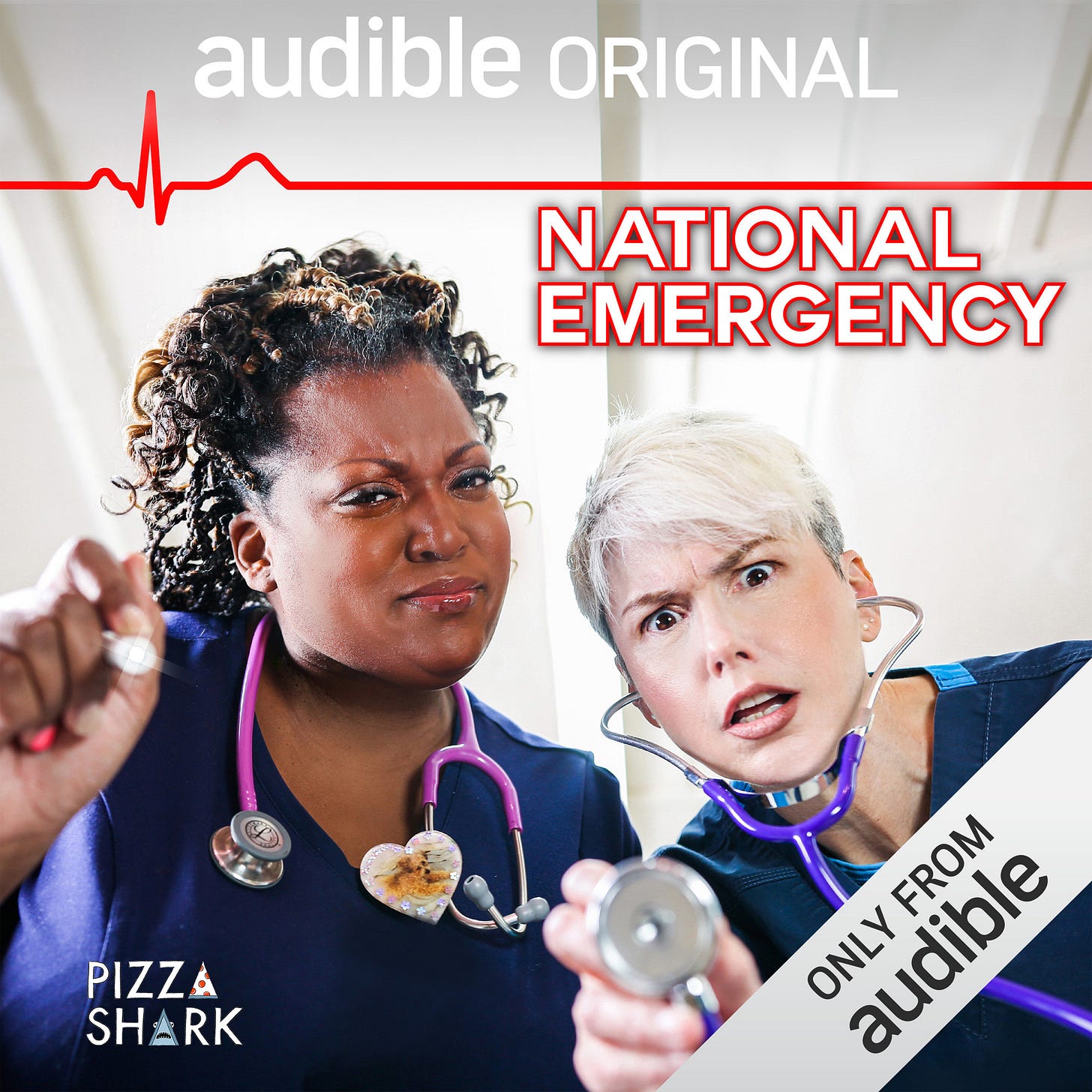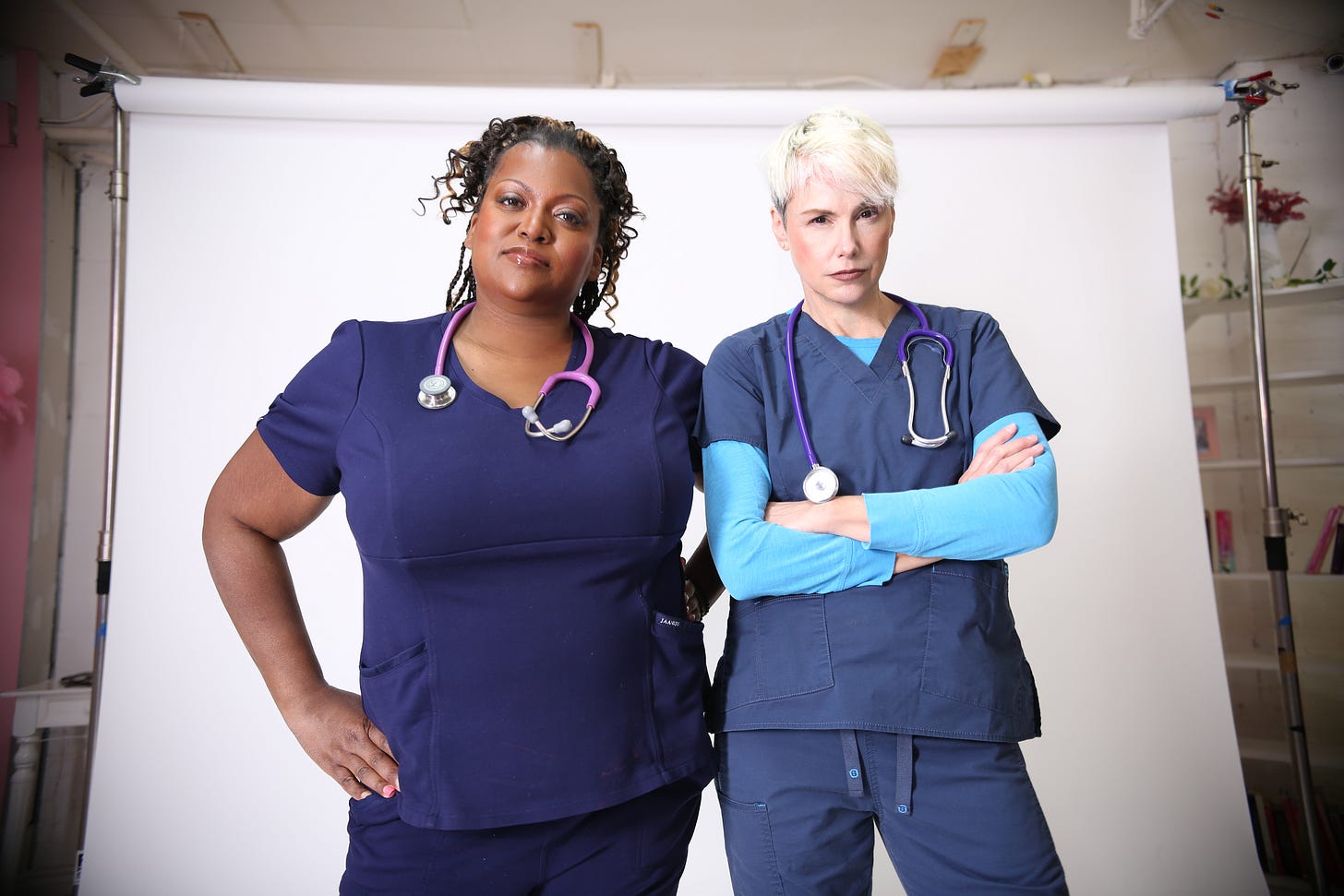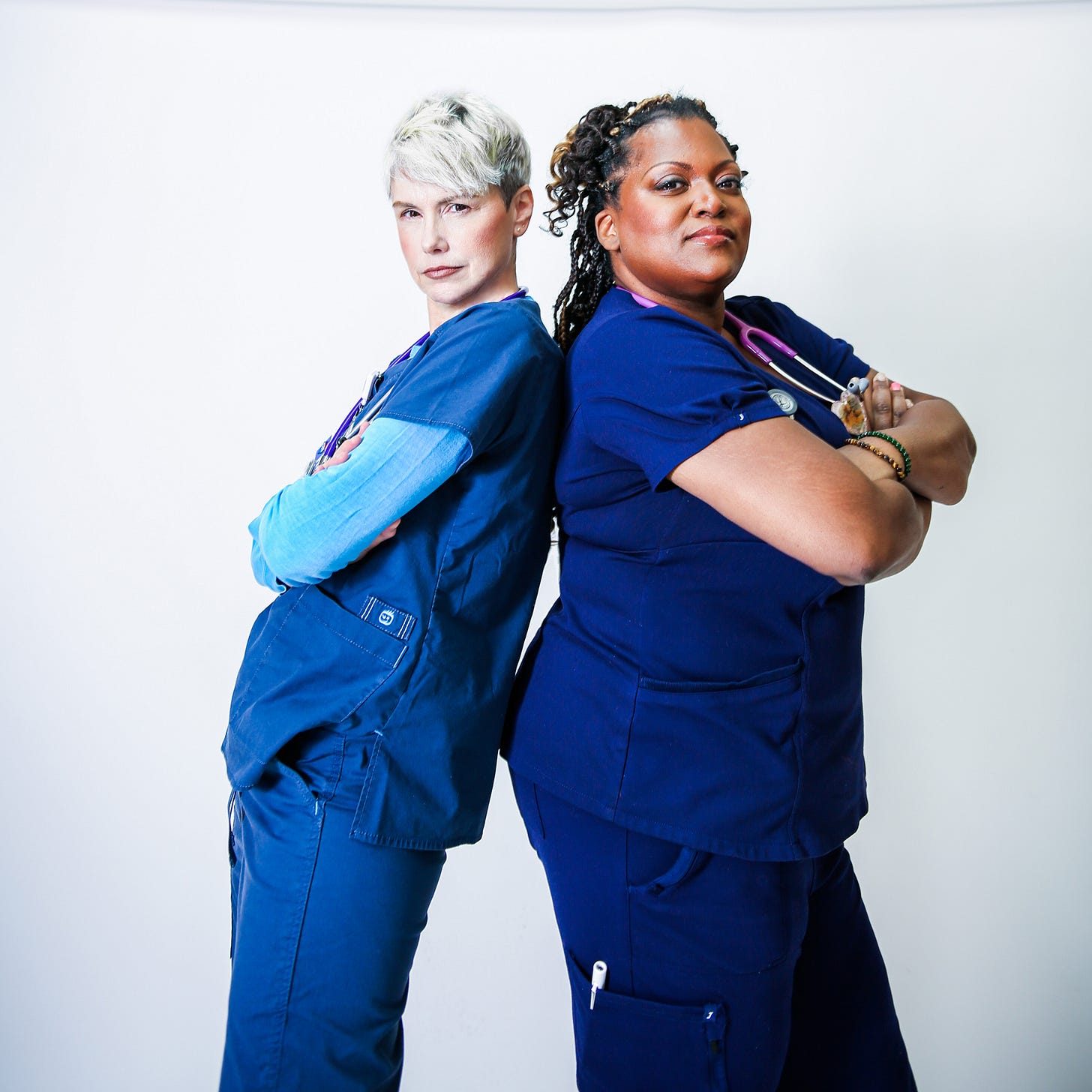🎤 Interview: Kate O'Connell & Ann Marie Awad
Meet the team behind National Emergency podcast.
National Emergency - Co-Host
Kate O'Connell is a writer, audio producer, and ER nurse in Queens, NYC. She has worked as an employee health nurse at NBCUniversal at 30 Rock, volunteered with the Red Cross at shelters in Queens post-hurricane Sandy, and volunteered throughout 2021 to administer Covid vaccines for the NYC Department of Health. Kate’s work can be heard on WHYY’s The Pulse and at Transom.org where she wrote and co-produced with Samantha Broun the audio series Pandemic ER: Notes from a Nurse in Queens in 2020.
National Emergency - Producer
Ann Marie Awad is an independent journalist and podcast creator based in Denver, CO. Ann is the producer and lead reporter for National Emergency, working closely with ER nurses Kate O'Connell and Nashia Williams to realize their vision for the show. Ann is also a drug policy journalist, and host of the award-winning podcast On Something, all about life after cannabis legalization. A 2022 journalism fellow at the UC Berkeley Center for the Science of Psychedelics, Ann is currently developing yet another podcast about drugs.
Follow Ann on LinkedIn and listen to their TED Talk “Want to stop police brutality? Legalize drugs”
I was excited to talk to Kate and Ann about making of National Emergency, a podcast about the major public health crises that the United States faces. I talked with the pair about some of the reporting they’ve navigated on and off the show, and how much of a rockstar co-host Nashia Williams is (listen to the audio for that!) and their plans for the future.
Please note: The audio–as always–is a rough edit in Descript, but I provide it as an alternative to reading, and because I often leave more content in than what makes the written version. The written version has been edited and condensed for clarity.
P.S. Though National Emergency is an Audible podcast, you can try the show for free!

I’m not going to read the whole summary from the show Kate and Ann work on together called National Emergency. Instead I’m just going to share these two lines: [Nashia and Kate] “learned that the ER is often the last stop for those who've been failed by America’s systems. In fact, if the United States itself walked into Kate and Nashia’s ER, they’d rush the country straight into Trauma 1.” Let’s start where that ends. What is trauma one?
Kate: Well, trauma one is just the name of a room. In most emergency departments across the United States you have several dedicated trauma rooms that are for resuscitation, or for anyone who comes in who's a level one or two that immediately needs to go in and be seen because their acuity is so high.
And so is the U.S. a level one or a level two?
Kate: I'd say a level one in my triage book, just because it's a resuscitation that is technically already in progress. And by resuscitation, I guess I mean the things we talk about on the show, which is that things have reached sort of a desperate level of people just trying to stay alive, trying to keep themselves, bodily and mentally together. It's past the line now. It's definitely past the line.
Some episodes in this season include a focus on gun violence, mental health, sex education, and carceral care. One episode in particular happens to relate to the curation I did around how climate change is leading to more extreme weather and how we adapt. That episode of National Emergency is called “When the Storm Hits: ‘Bubblegum, Prayer, and Band-Aids’” where you call out this very phenomenon, and the fact that we don’t have our national infrastructure together.
Kate, what made you and your cohost Nashia interested in diving into this topic?
Kate: Well, I have to say it's not as much fun to work on a project when you're only doing remote things and everyone's in a different place, but I think it was interesting that all of us live in different regions of the United States. And so we all kind of had our own perspective on what's happening in terms of climate change and how it's affecting our regions.
Ann's on Mountain Time and I'm on Eastern Standard Time. And we had producers in LA and Chicago and New Orleans. So that was really good that we had that perspective. I'm sitting in New York right now, the sky is light orange again, the air quality is poor, and this has to do with the wildfires in Quebec that are directly related to climate change issues.
I worked when the first big smoke came through New York a few weeks ago, I had a ton of people coming in with respiratory issues, people that have COPD or other respiratory problems and this is just exacerbating that.
I read your bios and I know that Kate, you worked after Hurricane Sandy and then Nashia did disaster relief and Puerto Rico after Hurricane Maria.
Ann, I know you're based in Colorado. When you were working on this particular episode, is there anything interesting or surprising that you learned?
Ann Marie: Yeah. We were sort of talking about which natural disaster was gonna be the focus of this episode early on, but we had different ideas for different reasons and one of the reasons I felt really strongly that Sandy should be our focus as it kind of ended up being was I lived in New York City.
I was actually out of town when Sandy actually happened, but I lived in New York City at the time. And that was like a story that never ended. I remember I was in journalism school and I was covering it as like a housing issue. In South Jersey, where people, a couple, you know, two, three years out still had all of this flooding and water damage in their homes. And because they [didn’t] own the home they [were] just kind of up shit creek.
And so I always was really fascinated with how Sandy was handled, particularly because so much, I mean, the entire early response was all just mutual aid. I think that's what made it a really fascinating story too. Judy, the subject of our episode, is not the only person who just put on their shoes and went out and just helped people.
And nurses were not the only ones that did that. Just average everyday people, set up care networks for each other. And I think we like end up talking about mutual aid so much in the show, but it just was so evident with Sandy; it was really hard not to talk about. And we tried really hard to track down a lot of those grassroots organizers.
It was so difficult because it's over 10 years ago now. But we finally found Judy, who is freaking amazing and happened to just have all of this experience with all of these other humanitarian disasters that she had responded to. And [she] had this real big picture way of looking at it. I mean, the quote that is in the title, is just kind of how she talks. I think that was what was so stunning to talk about her is she's seen all these really horrible things.
And she didn't mince words, sharing them with us. But she also still had such hope. That, you know, people like her just being on the ground and providing everyday essentials, like making sure people clean water and food, things like that…that is what matters in the moment. That was really cool.
One of the biggest or most acute national emergencies has been the pandemic. And while not explicitly covered on your show, going back to the trauma one metaphor, where do you believe things are now with the patient–the U. S.–and where do you think we have to go?
Kate: I'll speak from it professionally, but I kind of want to hear what Ann has to say. It's worse. You know, it's worse than before the pandemic. I would say it's much worse. For several reasons, some of them having to do with the pathology of illness, which is that a lot of people who were sick or began to get sick during the pandemic with other things put off getting medical care.
And the economic downturn that a lot of people faced because of the pandemic and the fact that the Medicare expansion didn't happen because of people who decided that health care is so political, and they wanted to side with the Trump administration and not expand their Medicaid in their states led to again more people not having insurance. And so emergency departments are being over overwhelmed.
Nashia and I see the emergency departments overwhelmed. But I have to say that hearing from internal medicine people and different doctors that we deal with in the hospital, like primary care physicians are also overwhelmed.
And particularly in rural areas and areas that don't have coverage…that don't have good medical care coverage. So, everyone's overwhelmed in terms of the volume of patients. There aren't enough practitioners to take care of all the patients and the emergency departments are the de facto appointment.
People just show up and they haven't been able to take care of themselves. I don't ever blame the patients. I really don't. If it was easier for them to get health care like it's easy to know where to send your kid to public school like that's how easy I wish it was. It wouldn't be like this, but this is where we're at.
And I would say the country is really limping in terms of its health right now really just bleeding out. Not good.
Ann Marie: Yeah, I don't know. I mean, I could sit here and spiral about this all freaking day. Honestly, I agree with Kate. I think there was like a window in 2020 where it felt like maybe things will really change. Maybe this is it. Maybe this is like the really uncomfortable, painful moment where stuff finally changes. And I think if I think back to that window for too long I get really upset because it does feel like things are not only “back to normal” but like worse. It feels like the insecurity that most people faced before the pandemic is so much more heightened.
It is so much easier to end up on the street than it was before 2020. It is so much easier to end up in medical debt that you will never dig yourself out of than it was in 2020. And I mean, I believe, okay, correct me if I'm wrong, I think it's one in five people are believed to have long COVID. So this is a permanent fixture of our lives now that we're not like acknowledging. And I think even worse, we're just forgetting about a lot of the social progress that was made in the early days of the pandemic.
A thing I see online a lot is that we effectively just solve childhood poverty and then change our minds. Like just stopped, like we did it and then we stopped. And so, it's hard not to look at things like that and feel absolutely soul-sucked. But I think the thing I personally have to keep in mind is that a lot more people got a lot more socially aware during the pandemic; the pandemic was like a radicalizing moment for me and a lot of others.
And I don't necessarily want to go back to normal and do the same kind of journalism that I did before 2020. And I know that a lot of other people don't either. So, I guess that keeps me afloat and like being able to do a show like this, really felt meaningful, because I don't know…there's something to be said about being on a team with a bunch of folks who just like get it.
We're not having these internal debates about a f***ing vaccine or anything like that. We all just get it. And we all get that things don't have to be this way. And that things could be better and that people don't deserve to die. But that this is the society we live in and somehow some way we have to give people tools to navigate it. And so that's why I think we do come back to things like mutual aid a lot, because we're all effectively out here on our own and all we have is each other. And so I think that was the attitude that we tried to bring to each of these issues; not everybody out there is giving up and you shouldn't necessarily either.
The first season of National Emergency was eight episodes. Hopefully you all are working or are able to work on a second season. Can you talk about what potentially a second season would look like? Like, what are some topics that you didn't get around to, that you would like to cover?
And I did think it was kind of interesting that Anne, you have this background as a drug policy journalist, but there wasn't an episode on the opioid epidemic.
Kate: Well, Nashia and I have had a lot of discussions about season two. We haven't formalized anything in terms of the group and talking about it. I think some ideas are just to go deeper on each of the topics that we started and something I would really like to do is get the team to really investigate how these things are solvable, like really specifically how they're solvable.
So many of the problems that we complain about, on the show or that we point out, have solutions that are really not actually that complicated. They just have to do with resources. They're functioning in other countries that have much less GDP than we have. So, I really wanna see resources put into these issues. Like, I don't understand, I keep banging my head. I mean, I know why they're not, but, I just have a hard time accepting that the morality of this country is that low and that sick-minded to not be helping each other.
But if it comes down to just we have to…it's every person for themselves and it's all just gonna be mutual aid, well so be it. But it's really pretty criminal when you think about all the resources in this country. And you look at other countries that have less resources, that are so much more sophisticated and managing these exact same problems in ways that are just doable. They're just doable like it doesn't have to be this big dramatic political statement. So I don't know, there's lots of ways to think about a season two.
You know, we talked about the pandemic and the opioid epidemic as two things that we felt like were very covered in discussions about health care. So, yeah, we don't quite quite go into them in the specifics, but I feel like actually those two things kind of color almost everything that we talk about in every episode.
I don't know what season two will bring; we'll see. But it's a great team, so I know we would come up with some great stuff.
So wrapping up, Sounds Like Impact is about highlighting solutions, which National Emergency does as well. Kate, if there's one action you'd want audiences to prioritize taking, what would it be?
Kate: Have less fear. Reduce your fear.
I don't know what else to say. All these media boogeyman being put out there– socialism, communism...–have nothing to do with your health and how easy it would be for this country to just take care of its citizens. So just have less fear.
Help other people have less fear. Try it. Try something new, you know, politically. Go for something that's good for you, that's literally just good for you. Like a glass of orange juice. That's all it is to vote in these certain directions. Doesn't really mean anything more than that. It doesn't have to mean anything more than that.
Ann, I don’t want to let you go without talking more about your experience as a drug policy journalist–a journalist who delivered an excellent TED Talk by the way. You are currently working on a new show of yours thanks to a journalism fellowship with UC Berkeley Center for the Science of Psychedelics. A previous show I recommended in the newsletter, Truth Be Told, host Tonya Mosley received the same journalism fellowship as you to explore psychedelics in reporting.
Can you give us a hint about what’s to come with your take on the theme?
Ann Marie: My fellow fellow. Well, first I should say that this is a collaboration with the same folks who brought you National Emergency [Pizza Shark].
It was an incredible experience working with them and so I'm looking forward to continuing any excuse to make shows together, basically. And yeah, this is a continuation of a lot of the work that I have done on On Something but obviously On Something dealt more specifically with cannabis legalization.
This is about all the drugs, and basically like the way that in American life, our attitudes about drugs and our policies about drugs are very out of step with each other. And so each installment is going to look at a different realm of American life where that's true like mental health, for example, and psychedelics. Like how the news media–my colleagues–cover things like fentanyl. All kinds of good stuff. I'm sure I'm going to make a lot of friends with this show…





